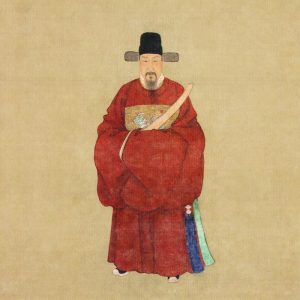Once enshrined in censorial offices and Confucian statecraft, jian – the duty to correct one’s ruler – was a channel through which conscience shaped governance. This fourth essay in the Simulated Sagehood series explores its erasure and replacement by an ethos of procedural conformity. Loyalty, once anchored in moral risk, is now reduced to measurable alignment with doctrine.
With remonstrance recoded as disloyalty, even the possibility of moral counsel has disappeared – not through argument, but design.
The most decisive break between classical Confucian governance and Xi Jinping’s political order lies in the disappearance of jian – the duty of loyal officials to correct their ruler. In the Confucian tradition, remonstrance wasn’t disobedience, it was moral fidelity. It expressed zhong, or loyalty, anchored in dao (the moral way) and legitimated by tianming (Heaven’s Mandate). As the Analects (14.22) makes clear: “When the ruler’s conduct is improper, the minister must correct him.” Critique was not treason but a sacred obligation, because authority was never final; it answered to something beyond itself.
This wasn’t just theory. Across dynasties, jian was built into governance. The Han dynasty’s Yushi Dafu (Imperial Censorate) and the Ming-Qing Duchayuan (Grand Court of Censors) institutionalized the practice. Censors submitted critiques of imperial decisions, exposed corruption, and even questioned the moral fitness of emperors – sometimes directly, sometimes through sealed memorials. Even autocratic rulers like the Yongzheng and Qianlong emperors reviewed these memorials carefully. In 1726, Yongzheng responded to a censorial petition on tax abuse in Zhejiang by ordering an immediate investigation. In 1790, Censor Zhaolian accused a provincial governor of embezzling funds for river management. Despite disliking Zhaolian’s accusatory tone, Qianlong launched an inquiry and later promoted him for “honest fearlessness.” The point wasn’t to tolerate insubordination; it was to recognize that moral clarity could be useful to rule.
Even under high autocracy, jian held weight. The Censor’s Box wasn’t just symbolic. Some officials were punished for sharp remonstrance, but others were commended. It was dangerous, yes – but not illegitimate. During the 1898 Hundred Days Reform, elite Confucian scholars invoked jian and tianming as moral grounds for sweeping reform. Even in the twilight of empire, the tradition of ethical counsel persisted as a brake on excess, a relic of moral constraint embedded within centralized rule.
Today, that architecture is gone. Under Xi, remonstrance has been displaced by organizational discipline. In 2018, the Chinese Communist Party (CCP)’s Central Commission for Discipline Inspection (CCDI) was effectively merged with the newly created National Supervisory Commission, a body with constitutional authority to investigate not only party members, but civil servants, educators, judges, and executives in state-owned enterprises. This new body reports only to the National People’s Congress and operates outside the court system. It unites party discipline and state supervision into a single, top-down compliance structure.
That same year, new regulations codified a vague but powerful charge: “improper discussion of the party center.” Under Article 46 of the revised CCP disciplinary code, speech that “questions central decisions” or “undermines ideological cohesion” can trigger formal sanctions. There is no clear legal standard. Comments in private settings may be punished alongside public ones. This echoes the 1957 Anti-Rightist Campaign, when over half a million individuals were denounced for critical essays submitted during the Hundred Flowers period. Many had explicitly invoked jian as a model of principled dissent. Their persecution established a chilling precedent: even loyal critique could be retroactively criminalized.
In 2023 alone, CCDI data recorded over 110,000 formal disciplinary cases. Thousands were punished for infractions ranging from “ideological deviation” to “incorrect speech.” The process unfolds through “organizational handling”: demotion, dismissal, forced resignation – all executed outside of courts, through internal party procedures. There is no trial or no judicial oversight, just institutional erasure.
This system redefines loyalty itself. In the Confucian worldview, zhong meant risking disfavor to uphold the moral order. In Xi’s China, loyalty is no longer ethical – it is procedural. Cadres are evaluated on their “ideological-political quality,” measured through metrics like attendance at study sessions, frequency of Xi Jinping Thought citations, and written compliance. Moral courage is displaced by performance analytics.
Even referencing alternative sources of ethical authority is risky. Internal party training materials now classify jian and tianming as “historically superseded conceptual structures” – suitable for cultural education, not political reasoning. They are relics, not resources. Invoking them, even obliquely, can trigger surveillance or internal inquiries.
The stakes are more than administrative. Classical statecraft assumed that power must answer to a force beyond itself. Heaven could withdraw its mandate through rebellion, disaster, or loss of virtue. In the 1340s, Yuan Emperor Toghon Temur dismantled regional remonstrance offices after they criticized elite land seizures and corruption. The result was imperial isolation, policy decay, and eventual collapse. The dismantling of jian made the court deaf to its own unraveling.
That warning is no longer heard. In today’s system, there is no tian – no higher moral frame to answer to. The CCP now defines what is lawful and what is ethical, collapsing both into a single, self-validating structure. It is not merely that remonstrance has been eliminated. It has become unthinkable.
Even among authoritarian regimes, this is extreme. Vietnam retains elite consultation. Russia allows managed elections. Xi’s model permits no institutional dissent, no symbolic protest, no ritual substitute. The structure is airtight.
And so, jian disappears by quiet design. There is no longer a role for the principled critic, the righteous minister. What Confucianism once honored as moral clarity is now recoded as subversion. The ethic of remonstrance is not argued against, it is erased.

































